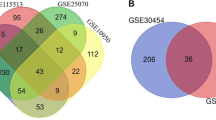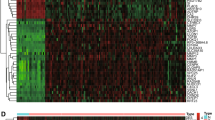Abstract
Here we intend to identify key genes and pathways in the pathogenesis of colorectal cancer (CRC) through analyzing microarray data with bioinformatic tools. The gene expression profile dataset GSE23878 was downloaded from Gene Expression Omnibus and differentially expressed genes (DEGs) were screened out using Student’s t-test. GO function and KEGG pathway enrichment analyses were performed for these DEGs with the DAVID online tool. Interaction network was constructed among the over-represented pathways based on the protein-protein interactions within the pathways. Besides, the protein interaction information obtained from HPRD database were applied to constructed protein-protein interaction networks among the DEGs and hub genes and function module were screened out. A total of 2,296 DEGs were obtained and they were enriched in 34 pathways. An interaction network was constructed among 32 pathways, in which p53 signaling pathway acted as the hub pathway as it showed the highest node degree. The protein-protein interaction network comprised 1,481 interaction relationships among 332 genes which included 40 DEGs. Further analysis revealed that theses DEGs formed 7 function modules and many genes, such as PDGFRB, MET, FZD2, CCND1, PRKCB, ARHGEF6, JUP, WNT2, WNT5A and WNT11 were key genes in the networks. The DEGs and disturbed biological functions uncovered in present study may play important roles in the development of CRC and can contribute to the understanding on molecular mechanisms of CRC. Further these DEGs we obtained can be acted as potential biomarkers for diagnosis and therapy of CRC.


Similar content being viewed by others
References
WHO. Cancer, fact sheet N°297, World Health Organization, reviewed January 2013 http://www.who.int/mediacentre/factsheets/en/
O’Connell JB, Maggard MA, Ko CY (2004) Colon cancer survival rates with the new American Joint Committee on Cancer sixth edition staging. J Natl Cancer Inst 96(19):1420–1425
Ramaswamy S, Tamayo P, Rifkin R, Mukherjee S, Yeang C-H, Angelo M, Ladd C, Reich M, Latulippe E, Mesirov JP (2001) Multiclass cancer diagnosis using tumor gene expression signatures. Proc Natl Acad Sci 98(26):15149–15154
Lanza G, Ferracin M, Gafà R, Veronese A, Spizzo R, Pichiorri F, C-g L, Calin GA, Croce CM, Negrini M (2007) mRNA/microRNA gene expression profile in microsatellite unstable colorectal cancer. Mol Cancer 6(1):54
Vogelstein B, Fearon ER, Hamilton SR, Kern SE, Preisinger AC, Leppert M, Smits AM, Bos JL (1988) Genetic alterations during colorectal-tumor development. N Engl J Med 319(9):525–532
Law DJ, Olschwang S, Monpezat J-P, Lefrancois D, Jagelman D, Petrelli NJ, Thomas G, Feinberg AP (1988) Concerted nonsyntenic allelic loss in human colorectal carcinoma. Science 241(4868):961–965
Vogelstein B, Fearon ER, Kern SE, Preisinger A, Nakamura Y, White R (1989) Allelotype of colorectal carcinomas. Science 244(4901):207–211
Thiagalingam S, Lengauer C, Leach FS, Schutte M, Hahn SA, Overhauser J, Willson JK, Markowitz S, Hamilton SR, Kern SE (1996) Evaluation of candidate tumour suppressor genes on chromosome 18 in colorectal cancers. Nat Genet 13(3):343–346
Peltomäki P (2003) Role of DNA mismatch repair defects in the pathogenesis of human cancer. J Clin Oncol 21(6):1174–1179
Lynch HT, Lynch J (2000) Lynch syndrome: genetics, natural history, genetic counseling, and prevention. J Clin Oncol 18(suppl 1):19s–31s
DeRisi J, Penland L, Brown PO, Bittner ML, Meltzer PS, Ray M, Chen Y, Su YA, Trent JM (1996) Use of a cDNA microarray to analyse gene expression patterns in human cancer. Nat Genet 14(4):457–460. doi:10.1038/ng1296-457
Uddin S, Ahmed M, Hussain A, Abubaker J, Al-Sanea N, AbdulJabbar A, Ashari LH, Alhomoud S, Al-Dayel F, Jehan Z, Bavi P, Siraj AK, Al-Kuraya KS (2011) Genome-wide expression analysis of Middle Eastern colorectal cancer reveals FOXM1 as a novel target for cancer therapy. Am J Pathol 178(2):537–547
Irizarry RA, Hobbs B, Collin F, Beazer-Barclay YD, Antonellis KJ, Scherf U, Speed TP (2003) Exploration, normalization, and summaries of high density oligonucleotide array probe level data. Biostatistics 4(2):249–264
Bolstad BM, Irizarry RA, Astrand M, Speed TP (2003) A comparison of normalization methods for high density oligonucleotide array data based on variance and bias. Bioinformatics 19(2):185–193
Hochberg Y, Benjamini Y (1990) More powerful procedures for multiple significance testing. Stat Med 9(7):811–818
da Huang W, Sherman BT, Lempicki RA (2009) Bioinformatics enrichment tools: paths toward the comprehensive functional analysis of large gene lists. Nucleic Acids Res 37(1):1–13
Peri S, Navarro JD, Amanchy R, Kristiansen TZ, Jonnalagadda CK, Surendranath V, Niranjan V, Muthusamy B, Gandhi TK, Gronborg M, Ibarrola N, Deshpande N, Shanker K, Shivashankar HN, Rashmi BP, Ramya MA, Zhao Z, Chandrika KN, Padma N, Harsha HC, Yatish AJ, Kavitha MP, Menezes M, Choudhury DR, Suresh S, Ghosh N, Saravana R, Chandran S, Krishna S, Joy M, Anand SK, Madavan V, Joseph A, Wong GW, Schiemann WP, Constantinescu SN, Huang L, Khosravi-Far R, Steen H, Tewari M, Ghaffari S, Blobe GC, Dang CV, Garcia JG, Pevsner J, Jensen ON, Roepstorff P, Deshpande KS, Chinnaiyan AM, Hamosh A, Chakravarti A, Pandey A (2003) Development of human protein reference database as an initial platform for approaching systems biology in humans. Genome Res 13(10):2363–2371
Palla G, Derenyi I, Farkas I, Vicsek T (2005) Uncovering the overlapping community structure of complex networks in nature and society. Nature 435(7043):814–818
Adamcsek B, Palla G, Farkas IJ, Derenyi I, Vicsek T (2006) CFinder: locating cliques and overlapping modules in biological networks. Bioinformatics 22(8):1021–1023
Malumbres M, Barbacid M (2009) Cell cycle, CDKs and cancer: a changing paradigm. Nat Rev Cancer 9(3):153–166
Kastan MB, Bartek J (2004) Cell-cycle checkpoints and cancer. Nature 432(7015):316–323
Molaei M, Yadollahzadeh M, Almasi S, Shivarani S, Fatemi SR, Zali MR (2011) Sporadic colorectal polyps and mismatch repair proteins. Indian J Pathol Microbiol 54(4):725–729
Tajima A, Iwaizumi M, Tseng-Rogenski S, Cabrera BL, Carethers JM (2011) Both hMutSalpha and hMutSss DNA mismatch repair complexes participate in 5-fluorouracil cytotoxicity. PLoS One 6(12):e28117
Ramirez-Ramirez MA, Sobrino-Cossio S, de la Mora-Levy JG, Hernandez-Guerrero A, Macedo-Reyes Vde J, Maldonado-Martinez HA, Alonso-Larraga JO, Ramirez-Solis ME (2012) Loss of expression of DNA mismatch repair proteins in aberrant crypt foci identified in vivo by magnifying colonoscopy in subjects with hereditary nonpolyposic and sporadic colon rectal cancer. J Gastrointest Cancer 43(2):209–214. doi:10.1007/s12029-011-9303-z
Nishitani H, Lygerou Z (2002) Control of DNA replication licensing in a cell cycle. Genes Cells 7(6):523–534
Bandura JL, Calvi BR (2002) Duplication of the genome in normal and cancer cell cycles. Cancer Biol Ther 1(1):8–13
Macarthur M, Hold GL, El-Omar EM (2004) Inflammation and Cancer II. Role of chronic inflammation and cytokine gene polymorphisms in the pathogenesis of gastrointestinal malignancy. Am J Physiol Gastrointest Liver Physiol 286(4):G515–G520
Theodoropoulos G, Papaconstantinou I, Felekouras E, Nikiteas N, Karakitsos P, Panoussopoulos D, Ch Lazaris A, Patsouris E, Bramis J, Gazouli M (2006) Relation between common polymorphisms in genes related to inflammatory response and colorectal cancer. World J Gastroenterol 12(31):5037
Allen JI Molecular biology of colon polyps and colon cancer. In: Seminars in surgical oncology, 1995. Wiley Online Library, pp 399–405
Stegh AH (2012) Targeting the p53 signaling pathway in cancer therapy—the promises, challenges and perils. Expert Opin Ther Targets 16(1):67–83. doi:10.1517/14728222.2011.643299
Bunz F, Dutriaux A, Lengauer C, Waldman T, Zhou S, Brown JP, Sedivy JM, Kinzler KW, Vogelstein B (1998) Requirement for p53 and p21 to sustain G2 arrest after DNA damage. Science 282(5393):1497–1501
Tong WM, Hande MP, Lansdorp PM, Wang ZQ (2001) DNA strand break-sensing molecule poly(ADP-Ribose) polymerase cooperates with p53 in telomere function, chromosome stability, and tumor suppression. Mol Cell Biol 21(12):4046–4054. doi:10.1128/MCB.21.12.4046-4054.2001
Achanta G, Sasaki R, Feng L, Carew JS, Lu W, Pelicano H, Keating MJ, Huang P (2005) Novel role of p53 in maintaining mitochondrial genetic stability through interaction with DNA Pol gamma. EMBO J 24(19):3482–3492. doi:10.1038/sj.emboj.7600819
Liu G, Parant JM, Lang G, Chau P, Chavez-Reyes A, El-Naggar AK, Multani A, Chang S, Lozano G (2004) Chromosome stability, in the absence of apoptosis, is critical for suppression of tumorigenesis in Trp53 mutant mice. Nat Genet 36(1):63–68. doi:10.1038/ng1282
Iglesias P, Salas A, Costoya JA (2012) The maintenance of mitochondrial genetic stability is crucial during the oncogenic process. Commun Integr Biol 5(1):34–38
Lengauer C, Kinzler KW, Vogelstein B (1997) Genetic instability in colorectal cancers. Nature 386(6625):623–627. doi:10.1038/386623a0
Wehler TC, Frerichs K, Graf C, Drescher D, Schimanski K, Biesterfeld S, Berger MR, Kanzler S, Junginger T, Galle PR, Moehler M, Gockel I, Schimanski CC (2008) PDGFRalpha/beta expression correlates with the metastatic behavior of human colorectal cancer: a possible rationale for a molecular targeting strategy. Oncol Rep 19(3):697–704
Kuwai T, Nakamura T, Sasaki T, Kitadai Y, Kim J-S, Langley R, Fan D, Wang X, Do K-A, Kim S-J, Fidler I (2008) Targeting the EGFR, VEGFR, and PDGFR on colon cancer cells and stromal cells is required for therapy. Clin Exp Metastasis 25(4):477–489. doi:10.1007/s10585-008-9153-7
Di Renzo MF, Olivero M, Giacomini A, Porte H, Chastre E, Mirossay L, Nordlinger B, Bretti S, Bottardi S, Giordano S (1995) Overexpression and amplification of the met/HGF receptor gene during the progression of colorectal cancer. Clin Cancer Res 1(2):147–154
Fukuura T, Miki C, Inoue T, Matsumoto K, Suzuki H (1998) Serum hepatocyte growth factor as an index of disease status of patients with colorectal carcinoma. Br J Cancer 78(4):454
Gherardi E, Birchmeier W, Birchmeier C, Woude GV (2012) Targeting MET in cancer: rationale and progress. Nat Rev Cancer 12(2):89–103
Herynk MH, Stoeltzing O, Reinmuth N, Parikh NU, Abounader R, Laterra J, Radinsky R, Ellis LM, Gallick GE (2003) Down-regulation of c-Met inhibits growth in the liver of human colorectal carcinoma cells. Cancer Res 63(11):2990–2996
Frontini MJ, Nong Z, Gros R, Drangova M, O’Neil C, Rahman MN, Akawi O, Yin H, Ellis CG, Pickering JG (2011) Fibroblast growth factor 9 delivery during angiogenesis produces durable, vasoresponsive microvessels wrapped by smooth muscle cells. Nat Biotechnol 29(5):421–427
Suzuki H, Watkins DN, Jair KW, Schuebel KE, Markowitz SD, Chen WD, Pretlow TP, Yang B, Akiyama Y, Van Engeland M, Toyota M, Tokino T, Hinoda Y, Imai K, Herman JG, Baylin SB (2004) Epigenetic inactivation of SFRP genes allows constitutive WNT signaling in colorectal cancer. Nat Genet 36(4):417–422. doi:10.1038/ng1330
Segditsas S, Tomlinson I (2006) Colorectal cancer and genetic alterations in the Wnt pathway. Oncogene 25(57):7531–7537
Author information
Authors and Affiliations
Corresponding author
Rights and permissions
About this article
Cite this article
Wang, Y., Zheng, T. Screening of Hub Genes and Pathways in Colorectal Cancer with Microarray Technology. Pathol. Oncol. Res. 20, 611–618 (2014). https://doi.org/10.1007/s12253-013-9739-5
Received:
Accepted:
Published:
Issue Date:
DOI: https://doi.org/10.1007/s12253-013-9739-5




